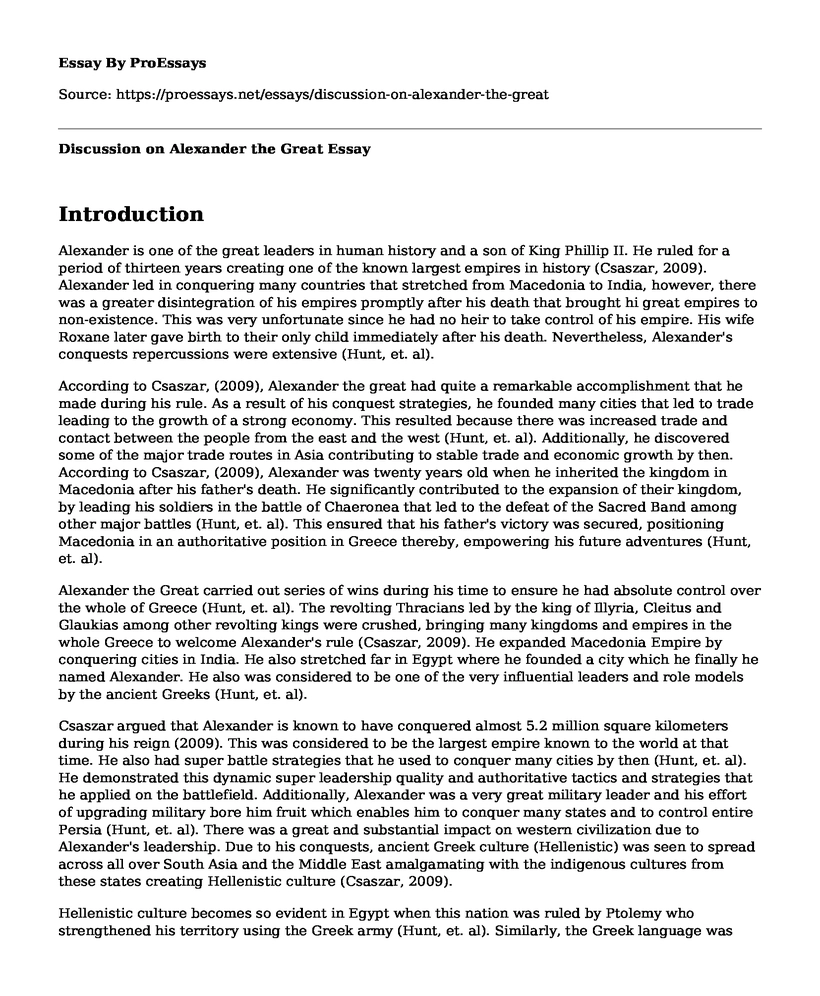Introduction
Alexander is one of the great leaders in human history and a son of King Phillip II. He ruled for a period of thirteen years creating one of the known largest empires in history (Csaszar, 2009). Alexander led in conquering many countries that stretched from Macedonia to India, however, there was a greater disintegration of his empires promptly after his death that brought hi great empires to non-existence. This was very unfortunate since he had no heir to take control of his empire. His wife Roxane later gave birth to their only child immediately after his death. Nevertheless, Alexander's conquests repercussions were extensive (Hunt, et. al).
According to Csaszar, (2009), Alexander the great had quite a remarkable accomplishment that he made during his rule. As a result of his conquest strategies, he founded many cities that led to trade leading to the growth of a strong economy. This resulted because there was increased trade and contact between the people from the east and the west (Hunt, et. al). Additionally, he discovered some of the major trade routes in Asia contributing to stable trade and economic growth by then. According to Csaszar, (2009), Alexander was twenty years old when he inherited the kingdom in Macedonia after his father's death. He significantly contributed to the expansion of their kingdom, by leading his soldiers in the battle of Chaeronea that led to the defeat of the Sacred Band among other major battles (Hunt, et. al). This ensured that his father's victory was secured, positioning Macedonia in an authoritative position in Greece thereby, empowering his future adventures (Hunt, et. al).
Alexander the Great carried out series of wins during his time to ensure he had absolute control over the whole of Greece (Hunt, et. al). The revolting Thracians led by the king of Illyria, Cleitus and Glaukias among other revolting kings were crushed, bringing many kingdoms and empires in the whole Greece to welcome Alexander's rule (Csaszar, 2009). He expanded Macedonia Empire by conquering cities in India. He also stretched far in Egypt where he founded a city which he finally he named Alexander. He also was considered to be one of the very influential leaders and role models by the ancient Greeks (Hunt, et. al).
Csaszar argued that Alexander is known to have conquered almost 5.2 million square kilometers during his reign (2009). This was considered to be the largest empire known to the world at that time. He also had super battle strategies that he used to conquer many cities by then (Hunt, et. al). He demonstrated this dynamic super leadership quality and authoritative tactics and strategies that he applied on the battlefield. Additionally, Alexander was a very great military leader and his effort of upgrading military bore him fruit which enables him to conquer many states and to control entire Persia (Hunt, et. al). There was a great and substantial impact on western civilization due to Alexander's leadership. Due to his conquests, ancient Greek culture (Hellenistic) was seen to spread across all over South Asia and the Middle East amalgamating with the indigenous cultures from these states creating Hellenistic culture (Csaszar, 2009).
Hellenistic culture becomes so evident in Egypt when this nation was ruled by Ptolemy who strengthened his territory using the Greek army (Hunt, et. al). Similarly, the Greek language was spoken all over the land. States that were conquered by Alexander the great were so much influenced such that they inaugurated the Greek religion, political, language and artistic styles into their cultures (Csaszar, 2009). After the death of Alexander the great, other new kingdoms arose and blended Hellenism with their own cultures. According to Csaszar, (2009), this led to the creation of the most robust civilizations of the classical world that has greatly impacted our modern societies making his influence on western civilization vivid and cannot be denied.
Reference
Csaszar, T. (2009). Waldemar Heckel, The Conquests of Alexander the Great. Past Imperfect, 15. doi: 10.21971/p7k59q
Hunt, L., Martin, T., Rosenwein, B., & Smith, B. The Making of the West.
Cite this page
Discussion on Alexander the Great. (2022, Aug 14). Retrieved from https://proessays.net/essays/discussion-on-alexander-the-great
If you are the original author of this essay and no longer wish to have it published on the ProEssays website, please click below to request its removal:
- The Childhood War Trauma Analysis
- Research Paper Example - The History of Egypt: from 3500 BCE to 1650 AD
- Life and Legacy of Henry James Essay
- Prince Henry Essay Example
- Essay Sample on Exploring Pre-Civil Wars: Horwitz and Law Olmsted's Extraordinary Journey
- Essay Example on Rebuilding America After Civil War: Reconstruction Successes & Challenges
- The Neolithic Era and Revolution - Free Paper Example







